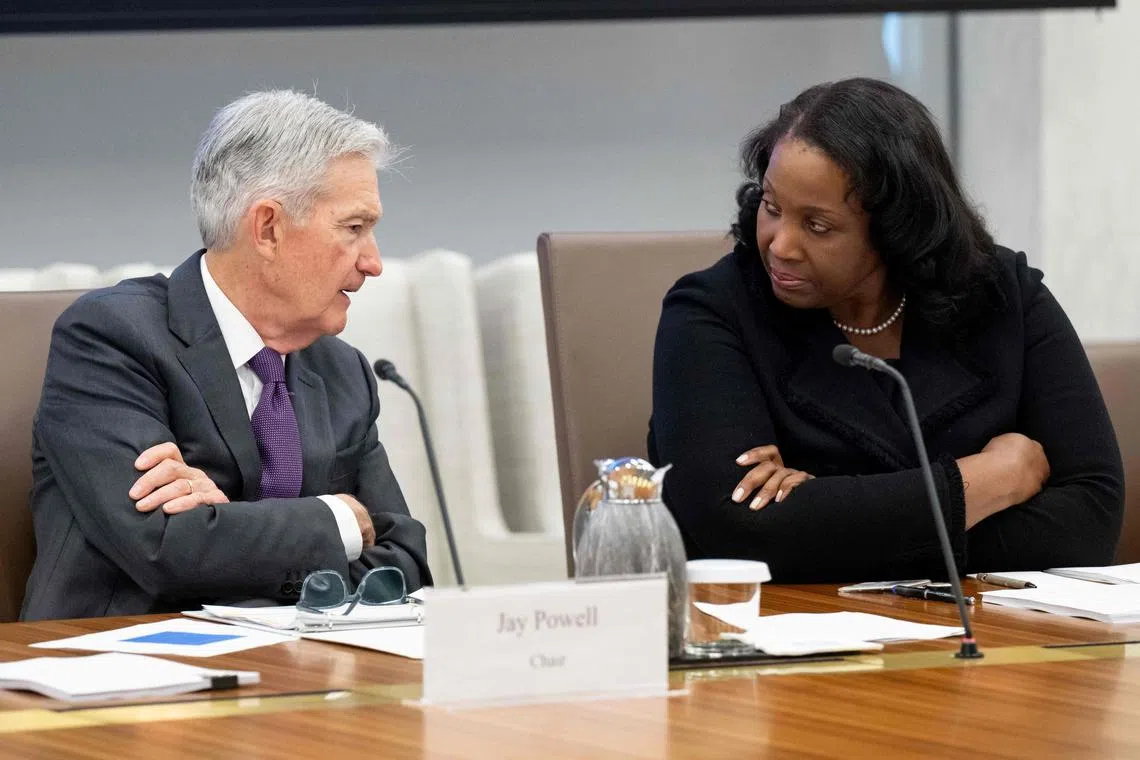US Fed governor Lisa Cook will sue Trump to keep her job, says lawyer
Sign up now: Get ST's newsletters delivered to your inbox

US Federal Reserve chairman Jerome Powell speaking to Dr Lisa Cook as he chaired a Federal Reserve Board meeting in June 2025.
PHOTO: AFP
Follow topic:
- Fed governor Lisa Cook will sue to block President Trump from firing her, arguing his attempt lacks legal basis, following a referral letter.
- Trump claims "sufficient cause" due to mortgage applications listing separate properties as primary residences, accusing Cook of "deceitful and criminal conduct".
- Legal scholars question whether past actions qualify as "for cause" removal, with concerns about executive power and the Fed's independence.
AI generated
NEW YORK/WASHINGTON – Federal Reserve governor Lisa Cook will file a lawsuit to prevent President Donald Trump from firing her, a lawyer for the embattled central bank official said on Aug 26, kicking off what could be a protracted legal fight over the White House’s effort to shape US monetary policy.
“His attempt to fire her, based solely on a referral letter, lacks any factual or legal basis. We will be filing a lawsuit challenging this illegal action,” Dr Cook’s lawyer, prominent Washington attorney Abbe Lowell, said in a statement.
The statement was issued a day after Mr Trump said he would fire Dr Cook,
Dr Cook has said Mr Trump does not have the authority to fire her and has vowed to stay on the job.
Mr Trump’s showdown with the nominally independent central bank follows other largely successful efforts to bring other elements of the US government under his direct control. Since returning to office in January, the President has overseen the departure of hundreds of thousands of civil servants, dismantled several agencies, and withheld billions of dollars of spending authorised by Congress.
He pressured the Fed to lower interest rates during his first term in the White House, and he has escalated that campaign in recent months. The President has demanded that rates be cut by several percentage points and has threatened to fire Fed chairman Jerome Powell, although he recently backed away
The attempt to influence US monetary policy has knocked confidence in the dollar and US sovereign debt, and sparked fears of global financial turmoil. But market reaction to Mr Trump’s latest Fed gambit was tame on Aug 26.
Wall Street’s main equities indexes were largely flat on the day, while the dollar dropped. Yields on two-year, five-year and 10-year Treasury notes fell, reflecting higher expectations of a near-term rate cut, and rose on longer-dated bonds, in a sign that the Fed’s inflation-fighting credentials might weaken.
Mr Trump said in a letter to Dr Cook on Aug 25 that he had “sufficient cause” to fire her because she had described separate properties in Michigan and Georgia as primary residences on mortgage applications before she joined the Fed in 2022.
In recent months, he has fired several black women who held senior government positions, including the head of the Library of Congress and the chair of the National Labour Relations Board.
The Trump administration has also targeted other political opponents with similar accusations of mortgage fraud, including New York Attorney-General Letitia James, a black woman who secured a half-billion-dollar civil fraud judgment against Mr Trump in 2024. A New York appeals court threw out the penalty
Mortgage questions
Mr William Pulte, a Trump appointee who is director of the Federal Housing Finance Agency, first raised questions about Dr Cook’s mortgages last week and referred the matter to US Attorney-General Pamela Bondi for investigation. Ms Bondi has yet to say whether the Justice Department will take action.
Mr Trump on Aug 26 accused Dr Cook of having “deceitful and criminal conduct in a financial matter” and said he did not have confidence in her “integrity”.
Dr Cook took out the two mortgages in question when she was an academic. Loans for primary residences can carry lower rates than mortgages on investment properties, which are considered riskier by banks. Dr Cook listed three mortgages, including two personal residences, on a 2024 financial disclosure form.
She is due to serve on the Fed board through 2038, but the Federal Reserve Act of 1913 allows the removal of a sitting governor “for cause”.
Until now, that power has not been tested by US presidents, who largely have taken a hands-off approach to Fed matters as a way to ensure confidence in US monetary policy.
Legal scholars and historians said the thicket of issues that could be raised in a legal challenge would span questions around executive power, the Fed’s unique quasi-private nature and history, as well as whether anything Dr Cook did amounted to cause for removal.
Professor Peter Conti-Brown, a scholar of the Fed’s history at the University of Pennsylvania’s Wharton School, noted that the mortgage transactions preceded Dr Cook’s appointment to the Fed and were in public records when she was vetted and confirmed by the Senate.
“The idea that you can then reach back, turn the clock backward and say, you know, ‘All these things that have happened before now constitute fireable offences from your official position’, is to me, incongruous with the entire concept of ‘for cause’ removal,” Prof Conti-Brown said.
It is unclear how the matter might play out ahead of the Fed’s next policy meeting on Sept 16 and 17.
Academic research has consistently found that policymakers who are allowed to manage inflation independent of political meddling generally achieve better outcomes, a principle that may now be tested at the world’s most influential central bank.
Mr Tim Duy, chief US economist at SGH Macro Advisors, said: “The Fed as an institution escaped harm in the first Trump administration, and will not be so fortunate this time around.”
Dr Cook’s departure would allow Mr Trump to select his fourth pick to the Fed’s seven-member board, including two incumbents and the pending nomination of White House economist Stephen Miran. REUTERS

